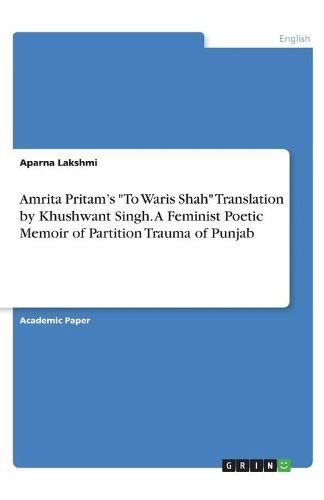Readings Newsletter
Become a Readings Member to make your shopping experience even easier.
Sign in or sign up for free!
You’re not far away from qualifying for FREE standard shipping within Australia
You’ve qualified for FREE standard shipping within Australia
The cart is loading…






Academic Paper from the year 2017 in the subject English Language and Literature Studies - Literature, language: English, abstract: The article aims to understand how Pritam's poem "To Waris Shah" shattered the Gandhian utopia of united India by documenting how the domestic and foreign agendas of communal hatred got drawn on the bodies of women. Amrita Pritam's Punjabi poem, "To Waris Shah" ("Ajj Aakhaan Waris Shah Nu", 1948) is translated into English by Khushwant Singh in 1982. Pritam gets hailed as the modernist literary heiress of the Punjabi Sufi poet, Waris Shah. Amrita Pritam in her elegy, To Waris Shah, attempts to wake her deceased idol forcing him to listen and witness the India-Pakistan Partition of 1947 that costed the heart-breaking wails of millions of daughters like Heer, the 'daughter of Punjab'.
$9.00 standard shipping within Australia
FREE standard shipping within Australia for orders over $100.00
Express & International shipping calculated at checkout
Academic Paper from the year 2017 in the subject English Language and Literature Studies - Literature, language: English, abstract: The article aims to understand how Pritam's poem "To Waris Shah" shattered the Gandhian utopia of united India by documenting how the domestic and foreign agendas of communal hatred got drawn on the bodies of women. Amrita Pritam's Punjabi poem, "To Waris Shah" ("Ajj Aakhaan Waris Shah Nu", 1948) is translated into English by Khushwant Singh in 1982. Pritam gets hailed as the modernist literary heiress of the Punjabi Sufi poet, Waris Shah. Amrita Pritam in her elegy, To Waris Shah, attempts to wake her deceased idol forcing him to listen and witness the India-Pakistan Partition of 1947 that costed the heart-breaking wails of millions of daughters like Heer, the 'daughter of Punjab'.